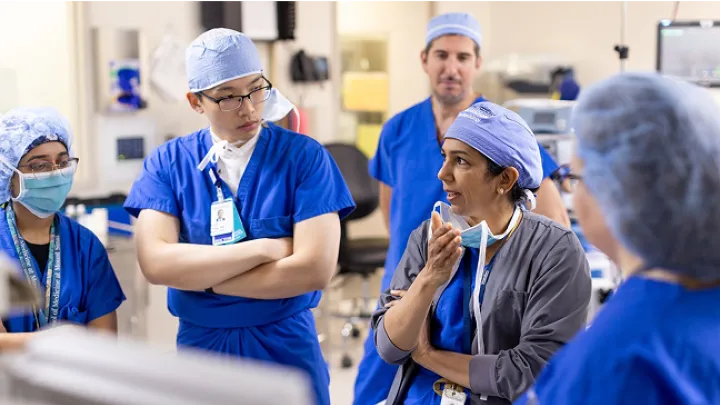Education & Training
Montefiore Einstein Anesthesiology consistently cultivates a learning environment that prepares our residents to become leaders in perioperative care and patient safety. Our world-renowned faculty encourages a culture of collaboration and curiosity, ensuring that our residents grow both personally and professionally. We offer an Accreditation Council for Graduate Medical Education (ACGME)-accredited residency program and eleven fellowship programs led by a team of internationally-recognized physicians with expertise in all anesthesiology subspecialties. We value innovation, empathy and integrity and emphasize that continuous personal development forms the foundation for the highest standards of patient care and academic scholarship.


Residency Program
Accredited since 1960, the Residency Program at Montefiore Einstein’s Department of Anesthesiology offers a dynamic and supportive environment for residents interested in research and clinical care, with numerous opportunities and topics to explore. Our Program places special emphasis on digital health research, ensuring that residents can pursue leading-edge projects that positively impact the community we serve. We offer dynamic and supportive research tracks for residents interested in becoming clinician-scientists, with extensive opportunities to build a research career.

Anesthesiology Fellowships
The Department of Anesthesiology offers unparalleled advanced training programs, including fellowships in all subspecialties. Our fellowship programs offer rigorous training in a supportive learning environment and leverage Montefiore Einstein’s broad spectrum of patients and expertise to provide comprehensive, one-year training in anesthesia subspecialties. These fellowships are CA-4 level programs encompassing clinical care and didactic teaching of residents in close collaboration with attending anesthesiologists. Our Adult Cardiac Anesthesia, Pediatric Anesthesia, Obstetric Anesthesia, Anesthesiology Critical Care Medicine and Regional Anesthesia and Acute Pain Medicine fellowships are accredited by the ACGME. Fellows participate in active clinical research with opportunities to complete several research projects and present findings at national conferences. A monthly Fellows’ College conference series provides education and guidance to all anesthesiology fellows on a range of nonclinical topics, complementing their experience in the operating room.
Faculty Fellowships: Anesthesia Leadership & Executive Operations (ALEOF)
This one-year fellowship is offered to two faculty members each year. The goal of the Program is professional development through project management with leaders in the Montefiore Einstein Health System and the Department of Anesthesiology. The curriculum covers topics such as effective project planning, coaching and mentoring, collaborative negotiations and community connections. The two strategic pillars of the ALEOF project focus on clinical duties and administration. The fellows meet biweekly with the Chair of the Department of Anesthesiology, Matthias Eikermann, MD, PhD, to ensure project consistency, implementation and assessment.
Performance Improvement Fellowship
We also offer an 18-month fellowship in Perioperative Management, Quality and Safety. One position is offered annually. The principles and practice of process improvement, quality and safety, particularly as applied to the complex perioperative environment, are the focus of this Program. The Perioperative Quality and Safety Fellow is an integral part of the perioperative anesthesia leadership group. The fellow is involved in the hands-on investigation, analysis and process improvement plan for all significant patient quality and safety issues in the preoperative, intraoperative and postoperative (PACU) areas. Additionally, the second component of the fellowship involves the fellow’s immersion in the clinical arena with concentrations on leadership, improved outcomes and patient safety issues in order to drive strategic change and foster a culture of quality and safety. The fellow also participates in educating and facilitating Department-wide quality initiatives on their process improvement journeys.


